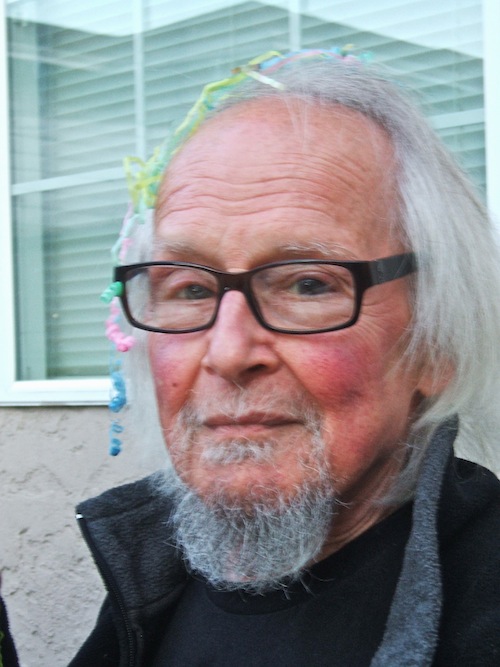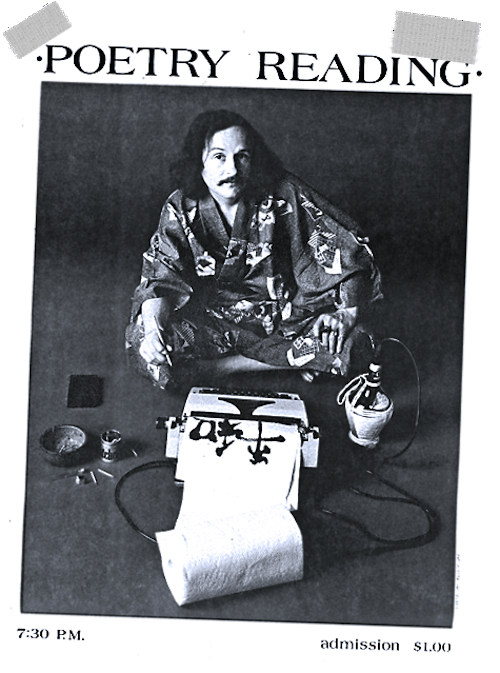The Maestro: David Meltzer, Part II
Prior to helping him assemble the collection that became When I Was a Poet, I knew little about David Meltzer or his work. Right before we met, however, I picked up a copy of The Agency Trilogy, a trio of pornographic novels written in 1968 for Essex House, the same outfit in L.A. that published the original edition of Bukowski’s Notes of a Dirty Old Man. David refers to the ten novels he wrote for Essex as “agit smut,” because they’re written not to titillate so much as to critique American society through depiction of depraved sexual power dynamics. To me, the Trilogy is a serious work of fiction disguised as pulp porn. (I tell people it’s like Beckett’s and even David laughs at me, yet I persist in this belief.)
But this was just one of David’s extracurricular activities, which also included signing to a major label as leader of a psychedelic folk-rock group, The Serpent Power, that included his late wife Tina on vocals and Clark Coolidge (!) on drums. Their eponymous LP (Vanguard Records, 1967) is definitely considered part of the psychedelic rock canon by the likes of Rolling Stone, and there are even “lost tapes” of a later, all-instrumental incarnation of the band, issued on cd as Ouroboros (Locust Records). Nearly a decade before, at age 21, he was giving some of the earliest jazz poetry readings of the beat period, documented on the 2005 cd Poet with Jazz (Sierra), and this move from jazz to rock is indicative of David’s ability to evolve with the times, rather than fossilize in a period, reluctant beat icon though he be. Still earlier, he was a child performer on The Horn & Hardart Children’s Hour, broadcast on both NBC radio and TV (the crazy, live, late ’40s beginning of TV). The more I raked up on the guy, the more amazing he got.
(This is the type of guy David is: I was recently watching kinoscopes of the Morey Amsterdam Show on youtube and wanted to describe to him an off-color improvisation by Art Carney. “You remember Morey Amsterdam?” I begin, and David replies in all innocence, “Oh yes, he gave me my first camera,” because, of course, David’s dad was a gag writer on that show.)
The endearing thing about David as a person is how lightly he wears all this. He’s conscious of his accomplishments as a writer, but he’s singularly devoid of that egomania to which well-known poets sometimes fall prey. We established a rapport immediately. While the title poem, “When I Was a Poet,” had occasioned Lawrence Ferlinghetti’s offer to publish a book, David didn’t have a manuscript ready to go, and he prefers working with an editor. “I just write the stuff,” he said. “I like someone else to put it together.” We drew a handful of pieces from various publications post-dating his previous book, a selected poems from Penguin called David’s Copy (2005). Selecting the rest among his unpublished work shed interesting light on his process.
As a poet born of typewriter and pen, David’s an unconventional computer user; instead of individual poems, each of his files is like a vast notebook for work in a particular vein, sometimes running to hundreds of pages. He was apologetic: “Without the stack of pages piling up, I lose track of how much I’ve written”—this from a man whose iconic photo depicts him with a roll of paper towels scrolling through his typewriter. In any case, we quickly established a procedure for handling the sheer volume of unpublished work. David would print out one of his files and whittle it down to a more manageable stack of the poems he found presentable. He’d then turn the stack over to me and I’d comb through it, taking only the best of the best. These in turn I would type up and email to Lawrence, who also took an active role in making the book what it became. Lawrence would look things over, reject what he didn’t like—only about 3 or 4 poems—and then give me his feedback about the development of the volume as a whole. We worked in this fashion for several months. We also took a number of poems, including the entire section “Lemme Be: Amulets,” from an unpublished typescript he’d completed in the 1980s and then mislaid for some years.
Given the diversity of material at our disposal, we decided to structure the book in sections, rather than as one continuous text. The title poem formed its own section, as did the amulets. The section called “Autobiographies” came together of its own accord, in that poems devoted to various figures in the poet’s past—his mother, his father, Wallace Berman, etc.—seemed to flow naturally together. We made a section for miscellaneous short poems and a closing section that took from the ’80s typescript two longish poems, “Night Reals” and “Dogma,” each of which appeared as a short fragment in David’s Copy. After the core of the manuscript was order, it was David’s turn to add the finishing touches, and he still had a few tricks up his sleeve. In addition to polishing some of the unpublished work, he wrote a new poem, “David Dog the Lion,” to close the volume, and also decided to add a short, vintage series, “French Broom,” which had previously appeared as an Oyez Press pamphlet in 1971 but was never collected into a book. Finally, and most significantly, between the beginning of our work on the book and the end, David met and fell in love with another poet, Julie Rogers, resulting in (among other things) the poem, “Jewelbox.” We made room in the section of shorter poems to add this final piece of the puzzle. (Note: Julie took the photograph of David accompanying this blogpost.)
Working on this book with David and Lawrence has been one of the greatest experiences thus far in my brief career as a City Lights editor. And David’s the perfect poet for the milestone 60th volume in the Pocket Poets series. Lawrence apparently always thought David was a great poet and would have published a book before, but, though he edited the collection of interviews San Francisco Beat (2001) and co-edited two issues of the Journal for Protection of All Beings (1961, 1978), David never submitted a poetry MS to City Lights. He’s one of those poets who wait to be asked, so it took Lawrence hearing “When I Was a Poet” and spontaneously offering to publish it, in order to make it happen. Clearly this book was meant to be.
Garrett Caples is the author of Lovers of Today (2021), Power Ballads (2016), Retrievals (2014), Quintessence...
Read Full Biography



